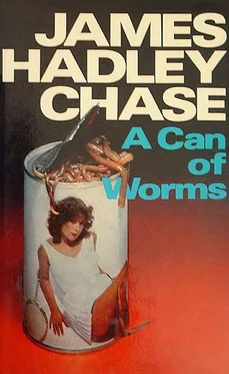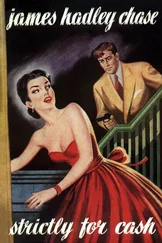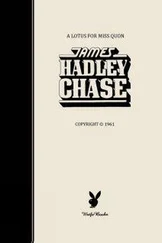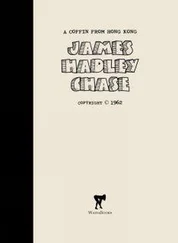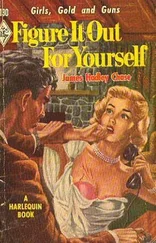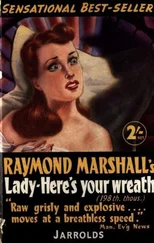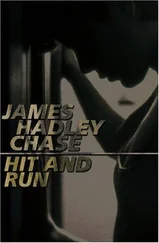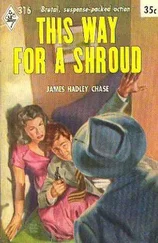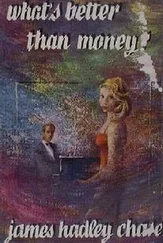Barney tossed the empty beer can into the harbour as a hint, but Lepski didn’t rise to it.
“Seen anyone like that around?” he repeated in his cop voice.
“Can’t say I have,” Barney said indifferently. “All these young punks look alike.”
“This punk’s a killer,” Lepski barked.
Barney shifted his eyebrows.
“Is that right?” He heaved himself to his feet. “I’m thirsty.”
“When aren’t you, you old soak?” Lepski snarled. “Have you seen him or haven’t you?”
“Not that I remember, Mr. Lepski,” Barney said with dignity, and waddled off towards the Neptune.
Lepski glared after him.
I had been looking towards the yacht basin. I could see Coldwell and Jacoby talking to a group of fishermen. I could also see Josh Jones, sitting on the deck of Hamel’s yacht. As Barney was walking away, I saw Jones get to his feet, jump off the yacht and disappear fast into the milling crowd.
“The man to talk to is Pete Lewinski. If he hasn’t seen Pofferi, no one has,” Lepski said. “He should be around somewhere.”
Pete Lewinski!
My heart skipped a beat. In spite of his drunkenness, I knew Pete remained a cop at heart. He wouldn’t hold back any information he thought would help the Paradise City police. If he were asked the right questions by Lepski, he would tell him of my interest in Josh Jones and the man and woman Jones had taken to his room the previous night. Then Lepski would turn on me. I had given Pete a description of my hippy and he would tell Lepski. If my hippy was Aldo Pofferi, and I was sure he was, I would be in a jam. I could get charged with concealing a criminal, or even worse, as an accessory after the fact.
“Pete’s a lush, Tom,” I said. “Let’s not waste time with him.”
“Maybe he is a lush, but he’s an ex-cop. That’s good enough for me.”
He stopped one of the waterfront’s riff-raff: a little old man, wearing a battered yachting cap and tattered, filthy ducks.
“Seen Pete around, Eddie?” Lepski asked.
“Not today, Chief. He’s usually around, but I ain’t seen him all day.”
“Do you know where he lives, Eddie?”
“Crab Yard. Number 26,” Eddie said, then hopefully, “Got a smoke to spare, Chief?”
Lepski gave him a cigarette, then nodding, he started off across the waterfront. I followed him, feeling clammy in spite of the heat.
Lepski plunged into the back alleys, dark and evil smelling, with old buildings constructed of wood and tar paper: the slum district of the waterfront. He seemed to know where he was going. I tagged along behind him.
“What a hole to live in,” he said.
I didn’t say anything. My mouth had turned dry. I kept trying to think of some lie to tell Lepski if Pete told him I had hired him to watch Jones.
“Here we are,” Lepski said, arriving at an archway that led to a small courtyard, surrounded by high, battered buildings. Tattered laundry festooned the buildings and were strung across the courtyard. Overflowing trash cans stood outside the entrances of the buildings, and the smell of decaying fish, stale frying oil, urine and rotting vegetables made me breathe through my mouth.
A group of dirty kids were kicking a ball around. When they saw Lepski, the game stopped and they all disappeared down another alley.
At the far end of the courtyard, Lepski found № 26. I had a feeling we were being watched, but looking around, could see no one.
Lepski peered through the doorway of № 26.
“What a stink!”
I looked over his shoulder into a dimly lit lobby: facing, were stairs. To the right, a passage, going away into complete darkness.
“Now, where does he hang out?” Lepski muttered. He moved forward, then taking a flashlight from his pocket, sent the beam down the passage.
At the far end of the passage was a door that stood ajar.
“Let’s try this one,” Lepski said, and started forward, then stopped. He directed the beam of the torchlight to the floor.
A red ribbon of blood came from under the door.
A gun jumped into Lepski’s hand, and he snapped off the flashlight.
“Cover me,” he muttered.
I went down on one knee, drawing my police special.
Lepski reached the door and kicked it wide open, then flattened himself against the wall.
Nothing happened. With his gun pushed forward, he peered around the doorway into the room.
Now the door was open, more light came into the passage.
“Hell!” he exclaimed, and walked into the room. “Stay where you are.”
I moved forward so I could see into the room.
Lying on the floor was an Indian boy of around fourteen years of age. He wore dirty white trousers and sandals. His T-shirt was bloodstained and blood caked his face. One look at his staring eyes told me he was dead.
“Look here,” Lepski said, and swung the beam of his flashlight to a dark corner.
Pete Lewinski, an empty bottle of Scotch clutched in his hand, sat hunched up against the wall. His face was a mess of blood. I could see the hole made by the bullet above the bridge of his thick nose.
“Find a phone and alert headquarters,” Lepski snapped. “I’ll stay here.”
As I left the building and started across the courtyard at a run, I realised with an enormous feeling of relief, that poor old Pete Lewinski wouldn’t now tell Lepski a thing.
It was just after 22.00 when I unlocked the door of my apartment, turned on the lights, closed and bolted the door, then went over to a lounging chair and sat down. I had brought beef sandwiches back with me, but I didn’t feel like eating. I had thinking to do.
Pete had told me he had a bunch of kids who would stay with Jones. It seemed obvious to me that the Indian boy, shot through the head, had been one of Pete’s kids. Could be Jones had spotted him, followed him back to Pete’s place and shot them both. I wasn’t satisfied with this thinking, but it would have to do to get on with. Anyway, this shooting told me as nothing else could that Jones and Pofferi were as dangerous as Coldwell had said they were.
The big question mark in my mind was Nancy Hamel. How did she come to get mixed up with Pofferi? I had no doubt she was helping him.
I stubbed out my cigarette and lit another. I was still puzzling, half an hour later, and still getting nowhere, when my front door bell rang.
I went into the lobby, shot back the bolt and opened the door.
Lu Coldwell advanced into the lobby, as I stood aside.
“Saw your light,” he said. “These shootings... mean anything to you?”
“Not a thing. Have a drink?”
“Why not?” He walked into my living room and sat down and stretched out his long legs. “There was such a goddamn uproar down there, I gave up asking anyone if they had seen Pofferi. I’ll get a couple of my men down there tomorrow when the dust has settled.”
“My guess is Pofferi has gone, if he was ever here,” I said as I handed him a stiff Scotch.
“I did ask around before half the cops in the city arrived. No one saw him. Maybe I’ll get the word from Nassau tomorrow.”
“It’s my bet that’s where he is.”
Coldwell drank half the Scotch, sighed, then finished the drink.
“What do you make of this shooting, Bart? I took a look. I’d say it was a professional killing. Two shots: two dead. That’s the way Pofferi kills. I’m wondering if there’s a tie up. What do you think?”
“More like someone had a grudge against Pete,” I said. “He fixed a number of drug-pushers in his time. Could be a payoff.”
“Why the boy?”
I shrugged.
“A witness, huh?”
He pulled at his nose and yawned.
“Well, it’s Lepski’s problem. Pofferi is my problem.”
I needed information the way a junkie needs a fix.
Читать дальше
